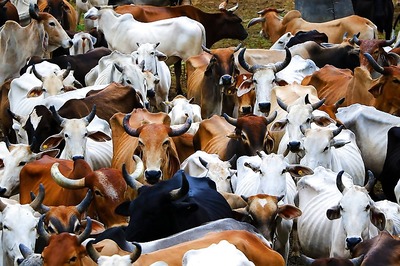
views
New Delhi: Pitching for passage of land acquisition and GST bills in Parliament, Finance Minister Arun Jaitley on Sunday said policy reforms and 8-10 per cent economic growth are a must to eliminate poverty.
With Congress and other opposition parties threatening to disrupt the upcoming Monsoon session, Jaitley said the message from the Socio Economic and Caste Census is clear that "growth and economic reforms help the poor as do targeted schemes".
The Census results, released on Friday, have painted a grim picture of the rural India, highlighting that one out of three families living in villages is landless and depends on manual labour for livelihood.
Jaitley said improving this situation is the "number one priority of this government".
"Growth or redistribution? Policy reforms or targeted anti-poverty schemes? We believe these are false choices. Both are necessary," the minister said in a Facebook post.
The way out to eliminate deprivation, Jaitley said, "is to achieve rapid economic growth of 8-10 per cent so that good jobs are created for all Indians quickly. That is why the government is promoting investment".
He said for the government to eradicate deprivation most effectively and quickly, "a permanent, formal sector, well-paid job is the best anti-poverty measure".
The latest data, the minister said, indicates that the investment cycle is slowly turning around and stalled projects were coming on stream at a faster pace.
In this regard, he added, "Passing the GST and reforming the land law will accelerate this investment turnaround."
These bills, which are with different committees of Parliament, may face tough time as the opposition is expected to disrupt the functioning of the Houses in view of the Lalit Modi controversy. The Monsoon session begins on July 21.
Jaitley said targeted schemes and policies are needed to ensure that the benefits of growth reach those who have been left out.
"The government has been helping the poor by giving them subsidies. But these are poorly targeted and leaky," he said, adding that the government's JAM (JanDhan, Aadhaar, Mobile) trinity would ensure that money reaches the hands of beneficiaries.
He said the Direct Benefit Transfer (DBT) of LPG subsidies would help government save Rs 12,700 crore this year.
"If we can be careful in our design and implementation, we can extend DBT to other commodities, so that the poor get more money to spend for their upliftment," Jaitley said.
The Census data, Jaitley said, reflects the conclusion that out of the seven measures of deprivation, the one that leads to the greatest amount of deprivation is being a landless household that derives a major part of its income from manual casual labour.
Data showed that 5.37 crore (29.97 per cent) households in the rural areas were "landless deriving a major part of their income from manual labour".
He said the government aims to increase public investment in roads, railways, rural infrastructure and connectivity, besides creating conditions for greater private investment.
"...implementing the GST and creating a common market, reforming land law, easing the costs of doing business and unblocking stalled projects are all measures that will improve the conditions for investment," Jaitley said.
The Census data showed that about 30 per cent of households encounter at least two out of the SECC's seven measures of deprivation and 49 per cent of households at least one. There are 17.91 crore rural households in India.
As many as 2.37 crore (13.25 per cent) families in villages lived in houses of one room with "kaccha" walls and roof.
It said that 21.53 per cent (or 3.86 crore) families living in villages belonged to SC/ST categories.



















Comments
0 comment